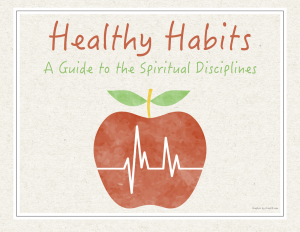John 15:4-5 says….
4 Remain in me, and I will remain in you. For a branch cannot produce fruit if it is severed from the vine, and you cannot be fruitful unless you remain in me.
5 “Yes, I am the vine; you are the branches. Those who remain in me, and I in them, will produce much fruit. For apart from me you can do nothing. John 15:4-5
This is the passage that we started looking at nearly two months ago. By now that might just be a distant memory for you, so I thought I’d better do a little bit of a refresher before we continue on with today’s message.
Back when we started this series, I talked a little bit about how we tend to grow less healthy and less fit over time unless we do something about it. I think that’s true for most people. At least it is for me! My job doesn’t require me to do a lot of physical activity – although this week has perhaps been an exception as we’ve moved and cleaned and setup and done all that stuff…. But generally I spend a lot of time working at my desk or visiting folks around the kitchen table – those aren’t very physically demanding activities.
To compound the problem, the cold of winter tends to encourage me to stay indoors, rather than outdoors. And on top of that, I’ve discovered that there are lot of really delicious things to eat in this world! So for me, it takes intentional effort to stay at least relatively healthy and fit. If I don’t want to get completely out of shape, I need to intentionally develop some healthy habits.
So maybe I need to practice eating a little more healthy. Maybe I need to get into the habit of exercising on a regular basis. Maybe I need to drive a little less and walk a little more.
But the bottom line is, if I want to stay healthy and fit, I need to develop some healthy habits.
And as we’ve been going through this series, we’ve discovered that the same is true spiritually speaking. If we want to stay spiritually healthy and fit – that is, if we want to remain in Christ, staying close and connected to Him so that we produce much fruit like that verse says – then likewise, we need to develop some healthy habits.
And that’s what this series has been all about. What are the healthy habits that Christians have been practicing for centuries that can help us develop that deep and meaningful relationship with Christ? What are those Spiritual Disciplines – as they are often known as – that help us stay connected with Jesus so that we can produce much fruit?
Well, actually there are a whole variety of those practices – Bible reading and prayer and worship are some of the more common ones – but there are also some other very valuable practices like fasting or times of silence and solitude that maybe aren’t so common these days, but are still very healthy habits when it comes to cultivating a deep relationship with God.
Now the most recent spiritual discipline or healthy habit that we’ve talked about has been reading and studying the Bible. We’ve spent a couple of weeks talking about the message of the Bible, how we know the Bible is true and that its actually the Word of God as it claims to be. We talked about how God’s Word transforms our lives. It changes the way we think – it shows us God’s eternal perspective – which in turn, complete changes the way we live our lives.
And we ended our last message with a warning from James 1:22 which says
“But don’t just listen to God’s word. You must do what it says. Otherwise, you are only fooling yourselves.” James 1:22
And that was really a lead into today message – which is how do we read and understand the Bible accurately – so that we can be sure that we actually do what it actually says? If we’re going to obey God’s Word – if God is going to change the way we think and transform our lives through his Word – if we are basing our entire lives and our eternal future on the words in this book, then we need to make sure we’re accurately understanding and applying what the Bible actually says.
Leave a Comment
